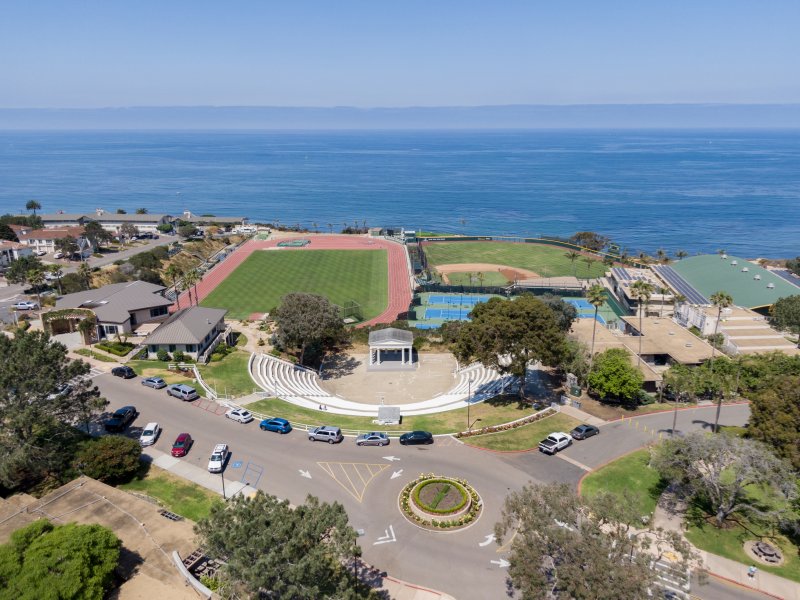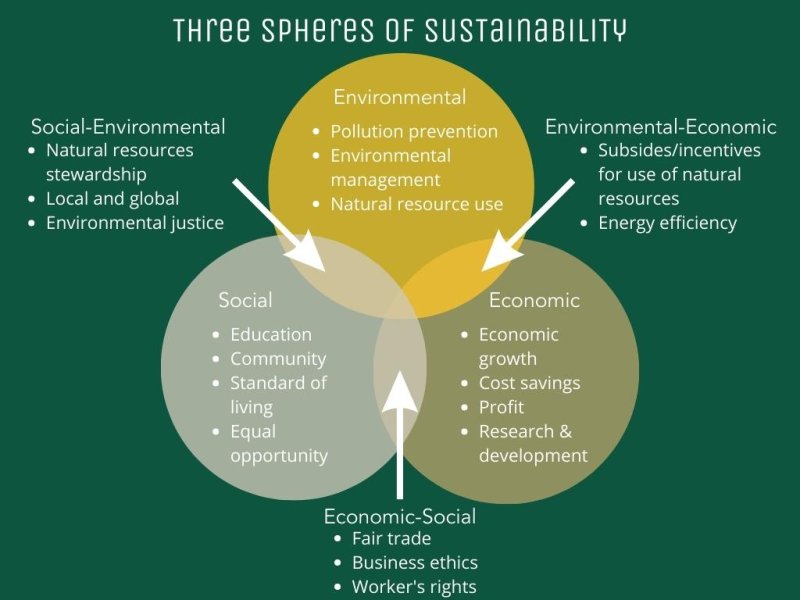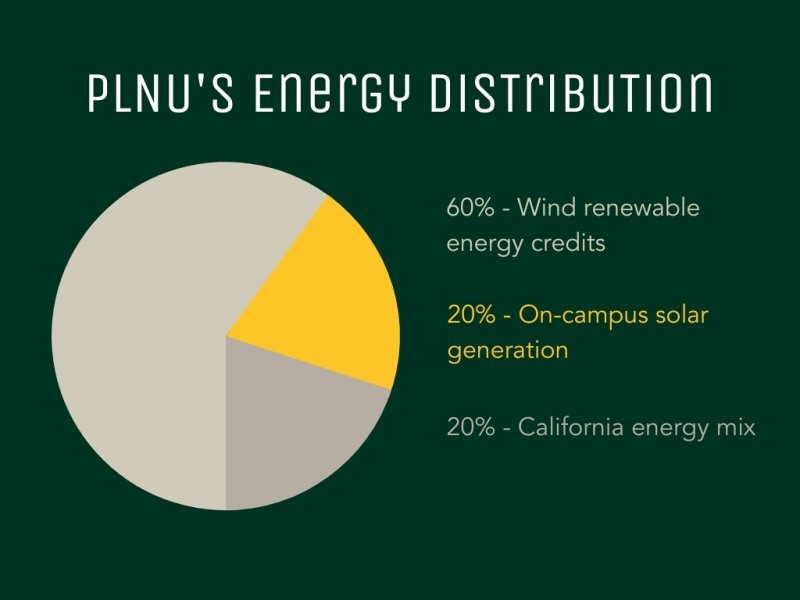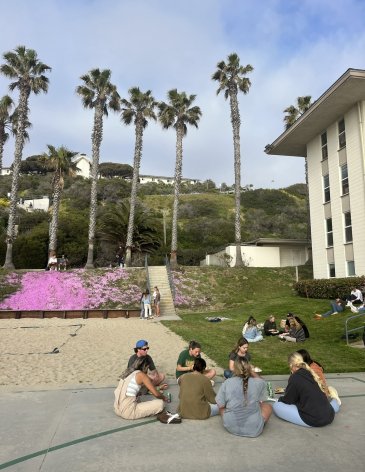
As the world grapples with environmental changes, it has become increasingly crucial for educational institutions to play a leading role in promoting sustainability. Nestled along the picturesque San Diego coastline, PLNU recognizes its unique responsibility in safeguarding the balance between its population and ecosystem.
What is sustainability?
Sustainability involves maintaining and avoiding the depletion of an ecological balance. According to the United States Environmental Protection Agency, “to pursue sustainability is to create and maintain the conditions under which humans and nature can exist in productive harmony to support present and future generations.”
The scope of this environmentally friendly practice is often described as including three sections — social, environmental, and economic.

Is sustainability important at educational institutions?
Sustainability is important so that current and future generations can enjoy things such as clean air and clean water. With sustainability, people can continue to live healthy lives without the negative health and lifestyle effects that come with environmental degradation.
This is especially important at educational institutions because these are the places in which students are forming their perspectives on the world. The importance of environmental sustainability needs to be highlighted so that students go out into their adult lives leading sustainable lives and bringing the value of sustainability into their career fields.
Why sustainability matters at PLNU
“Sustainability is particularly important at PLNU because of our location. Being right on the coast, our actions as a university have a significant impact on the surrounding coastal ecosystem of sunset cliffs, whether this be positive or negative. Additionally, being a Christian institution, sustainability efforts are particularly important to our role as good stewards and caretakers of God’s land.”
—Gustavo Bernal, Assistant Director of Campus Facilities, Service Management
How PLNU is sustainable
1. Technical implementation
Technical implementation refers to the tangible and measurable actions taken to reduce environmental impact and promote sustainability. It involves adopting technologies, systems, and practices that directly address natural resource conservation, energy efficiency, waste management, and other environmentally friendly aspects. Since 2015, PLNU’s Department of Sustainability has promoted environmental care through its treatment of:
- Waste
- Energy
- Water
- Carbon
- Food
Waste
Since 2004, PLNU’s waste reduction program has received over 16 awards. The program includes the three following categories:
| Mixed recycling | Blue bins are located in all residence halls, classrooms, lounge areas, and offices. Concrete recycling bins are located outdoors throughout campus. All of these recycling bins accept cardboard, aluminum, glass, paper, and sturdy plastics. |
|---|---|
| Composting | While pre-consumer food is donated, all post-consumer food waste at the cafeteria is composted locally at Miramar Greenery or on campus. Residence hall kitchens and many office lounges have compost bins where food scraps and coffee grounds are collected and composted. |
Donations and special recycling | At the end of each semester, donation bins are placed at each residence hall, where students can donate clothing and other items. Residence halls and offices have a box to collect ink and toner cartridges, batteries, and cell phones. |
According to Gustavo Bernal, the assistant director of Campus Facilities’ service management, the Department of Sustainability intends to revamp its e-waste recycling program in 2023. The program will focus on the educational component of proper electronic recycling practices.
Energy
Since 2008, various solar panels have been installed throughout campus that send power to select residence halls. This includes a solar thermal system that provides hot water to Nease Residence Hall.

In addition to the university’s solar power — which is generated on campus — PLNU purchases wind renewable energy credits (RECs) from a local provider. Approximately 60% of the university’s energy is covered by wind RECs, while 20% is covered by solar generation. The remaining 20% is currently powered by the standard California energy mix.
Water
Located on the oceanfront in San Diego, water conservation is a priority for PLNU. Over the past couple of years, lawns have been removed from areas that are not used by the student population and replaced with drought-tolerant plants. In 2009, the cafeteria went tray-less, which saves approximately 100,000 gallons of water each year.
The university is also transitioning its water fixtures (including faucets, showerheads, toilets, and urinals) to water-conserving models.
Carbon
In 2007, PLNU joined hundreds of universities nationwide in signing the Second Nature Carbon Commitment, which states that it will be carbon neutral by 2050. As part of this commitment, PLNU submits annual greenhouse gas inventories to monitor its progress.
By the fall 2023 semester, PLNU will have eight electric vehicle charging stations on campus. The university is also working on phasing out all of its fossil fuel vehicles (shuttles, golf carts, etc.) and moving entirely to electric vehicles.
Food
PLNU’s food partner, Sodexo, has a number of sustainability initiatives. This includes:
- Going trayless in the cafeteria
- Donating leftover food to the San Diego Rescue Mission through the Food Recovery Network
- Recycling 100% of dining hall food waste through the City of San Diego’s Food Scraps Composting at Miramar Greenery Program
- Offering a community garden, which is overseen by the Sustainability Department, where students can grow their own fruits and vegetables
- Implementing PLNU’s Local Purchasing Program: 30–40% of PLNU Dining produce is purchased from local farms, all milk is purchased locally, and most baked goods are purchased locally
2. Relational implementation
It is of utmost importance for universities to engage in exchanging knowledge and resources on environmentally friendly practices through partnerships with other organizations. Collaborative efforts in sustainability benefit not only the institutions involved but also the broader community and the planet as a whole.
By fostering internal and external partnerships, PLNU taps into a diverse pool of expertise and perspectives. This enables the exchange of innovative ideas, research findings, and best practices in eco-friendly development.
Internal partnerships
On top of growing sustainability infrastructure, PLNU’s Campus Facilities and Department of Sustainability strive to encourage the university’s campus community to participate in various stewardship opportunities. From hosting school-wide events to promoting daily activities, the Department of Sustainability also partners with a variety of different clubs and organizations, such as:
- The Center for Justice and Reconciliation
- Students for Environmental Action and Awareness Club
- Student Veterans of America
- PLNU Associated Student Body (ASB) and Senate
Two events that the Department of Sustainability hosted in the 2022–23 academic year were Creation Care Week and Lights Out 2023.
Creation Care Week
The Department of Sustainability annually collaborates with several campus clubs to host Creation Care Week. A goal of this week-long event is to provide students with opportunities to learn about their relationship with the environment.
During Creation Care Week 2022, students were invited to make upcycled arts and crafts, restore the university’s garden, view informative displays and presentations on campus, and more.
Lights Out 2023

In February 2023, the Department of Sustainability partnered with PLNU’s Residential Life to hold its very first Light Out, a campus-wide energy reduction competition for residence halls. From turning off lights and unplugging electronics to using lamps instead of overhead lights, all students were encouraged to participate.
The competition resulted in a 26,083 kilowatt-hour (kWh) reduction in monthly electricity consumption when comparing October 2022 to February 2023; each residence hall reduced its electricity consumption by at least 10%. For reference, the average American home uses an average of 10,632 kWh of electricity each year. The winning residence hall, Young Hall, was awarded a pizza party and bounce house for reducing their energy consumption by 40.1%.
The event was organized by Katrina Cloyes (23), who served as the Sustainability Student Programs Coordinator for Campus Facilities from 2022–23.
“It was such a great partnership, as we wanted to do something that was both fun and exciting and had a high impact. I believe that every event is better when more than one group is involved, and that is the heart of sustainability. People think that it is a lifestyle and if you’re not involved with it, then it’s not impactful, but that’s not true. In actuality, we really just need people to care a little bit more, especially on a college campus.”
—Katrina Coytes, 2022–23 PLNU Campus Facilities Sustainability Student Programs Coordinator
External partnerships
The Department of Sustainability has also developed strategic partnerships with several universities, non-profits, and other organizations. Through these partnerships, sustainability-oriented knowledge and resources are exchanged. Partners include but are not limited to:
- Biola University
- Texas Christian University
- Goodwill
- Sodexo
- The Surf Rider Foundation
- The Rock Thrift Store
How you can help
Small steps
Sustainable living often involves adopting new habits and behaviors. By starting with small, achievable actions, you can build momentum to continue taking further steps toward an eco-friendly lifestyle. Some small steps you can take include:
- Using reusable items for things such as grocery bags, coffee cups, and water bottles. This ends up saving a large amount of plastic pollution in the long run.
- Doing laundry in cold water on a gentle cycle. This decreases the amount of microplastics released into the water system and reduces the amount of energy used in the washing process.
- Reducing the number of plates and utensils that you use at home or at the cafeteria. This decreases the amount of water and energy used when they are washed.
- Having conversations with your peers or friends about sustainable practices. This opens room for collaboration and learning together!
Get connected
If you’re curious to learn more about practicing environmental stewardship and taking social responsibility at PLNU:
- Follow @sustainplnu on Instagram
- Email Dan Toro, Associate Vice President of Facility Operations and Campus Planning
- Email Gustavo Bernal, Assistant Director of Campus Facilities’ Service Management
- Check out Plant with Purpose’s website
- Check out Care of Creation’s website